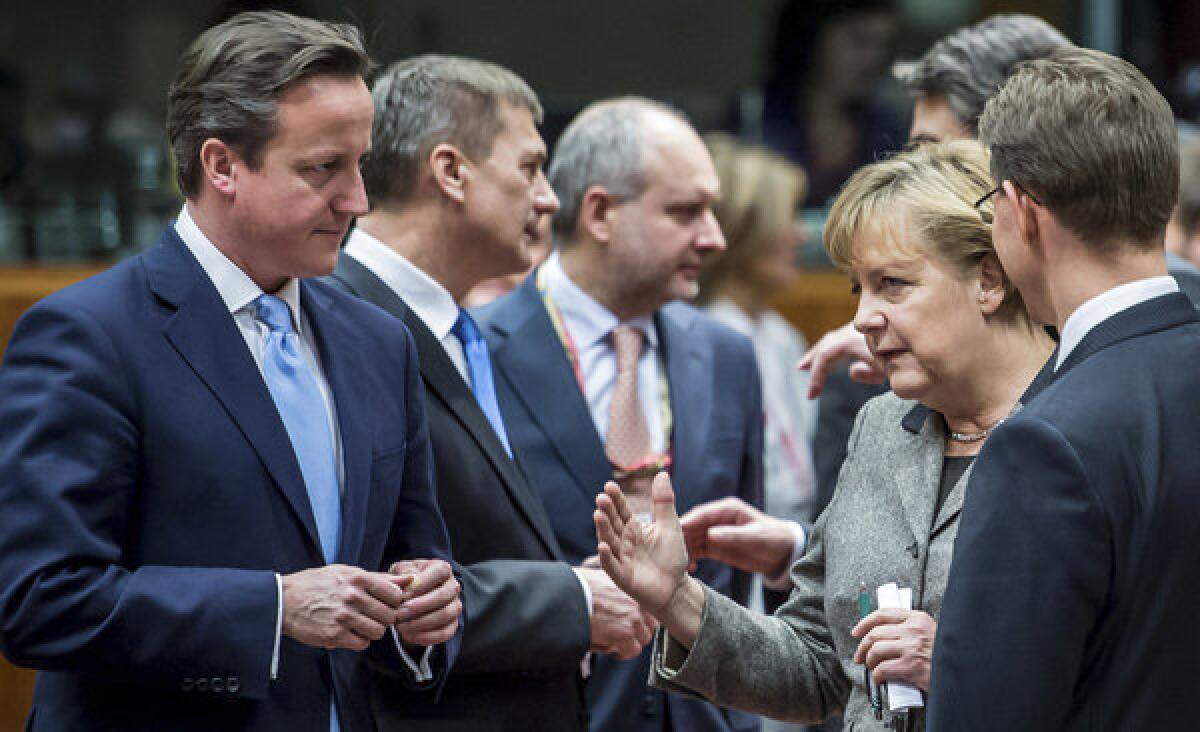European officials move to unify banks, aid Greece

- Share via
LONDON -- European officials Thursday took two more steps in their fight against the region’s lingering debt crisis, agreeing on a deal to put big banks under the oversight of a single supervisor and releasing desperately needed loans for Greece to pay its mounting bills.
The plan to have the European Central Bank supervise the Eurozone’s major financial institutions lays the foundation for a deeper “banking union” across the 17-nation currency bloc, or a harmonization of rules governing the finance sector.
Officials say such a convergence, with its stronger central oversight, would help stave off future banking crises such as those that have battered Spain and Ireland, whose governments have had to bail out bad banks but watched their own debts balloon in the process. Breaking the link between troubled banks and public finances has emerged as a key objective for European leaders eager to put the debt crisis -- now into its fourth year -- behind them.
“Piece by piece, brick by brick, the banking union will be built on this first fundamental step today,” said Michel Barnier, the European Union commissioner in charge of the bloc’s internal market.
The accord to expand the powers of the European Central Bank, or ECB, came after a marathon meeting of European finance ministers in Brussels and involved compromises on all sides, especially from the EU’s heavyweights, France and Germany.
Only about 100 to 200 banks will fall under regular ECB supervision, contrary to the desire of French negotiators, who wanted to see all 6,000 banks in the Eurozone under its oversight. German officials objected to that out of a wish to shield some of their nation’s smaller financial institutions from external review, but they agreed that the ECB could turn its sights on any bank at any time it deems necessary.
Britain, which does not use the euro, also won some safeguards against countries outside the Eurozone being subject to all the same rules.
The finance ministers also brought relief to Greece by approving the disbursement of $64 billion in emergency loans to Athens over the next several months. The Greek government has been living on a shoestring over the last few weeks waiting for release of the funds, which will allow it to avoid a chaotic default.
International creditors had held up the new batch of loans until they were satisfied that Athens had met the conditions for the money, including approving yet another round of harsh public spending cuts and other measures to reduce its staggering debt load. Greece announced this week that it would buy back about $41 billion in Greek bonds from investors at a fraction of their face value, which should also help Athens cut its mountain of debt.
“Greece is back on its feet,” Antonis Samaras, the country’s prime minister, told reporters. “The sacrifices of the Greek people have not been in vain. Today is not only a new day for Greece; it is indeed a new day for Europe.”
But the Mediterranean nation remains in a precarious position. It is about to enter its sixth straight year of deep recession, one out of every four workers is unemployed and social unrest continues to challenge the government.
ALSO:
Japan scrambles jets in dispute with China over islands
Syrian leader may be losing control, Russian official says
Israeli foreign minister to be indicted on breach-of-trust charge
More to Read
Sign up for Essential California
The most important California stories and recommendations in your inbox every morning.
You may occasionally receive promotional content from the Los Angeles Times.









